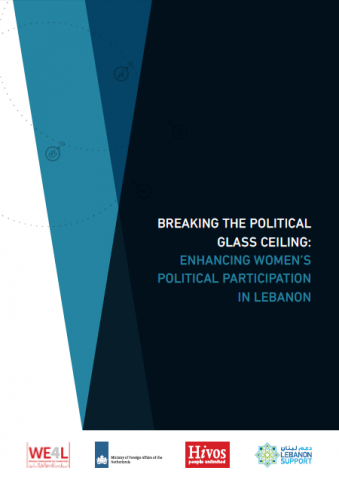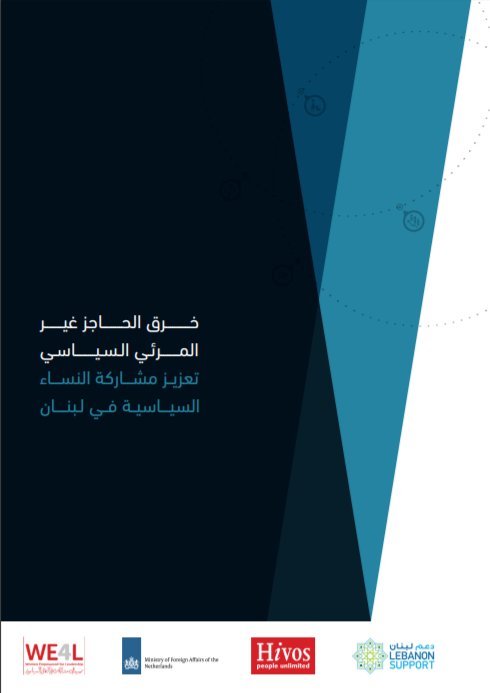Gender Equity Bulletin, Issue 14, June 2019 - Focus on Lebanon Support's Timeline: "Women, Power, and Politics: Timelines and Milestones"

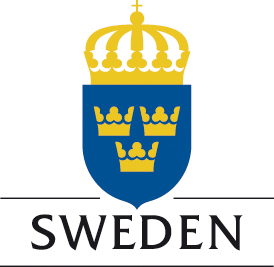

Issue 14, June 2019 - العدد رقم ١٤، حزيران ٢٠١٩
About the newsletter
Why the Gender Equity Newsletter?
This newsletter aims to connect gender actors and practitioners in Lebanon through the exchange of expertise, in an attempt to create a space for better collaboration, networking, and equal access to knowledge, research, and information. Issues cover the work of actors, their activities, and projects, in addition to recommending relevant resources and tools, as well as information and statistics relevant to gender work in Lebanon.
The gender equity newsletter is a part of the Gender Equity Network, a project by Lebanon Support in partnership with Diakonia
The Gender Equity Network is an online collaborative platform. It is part of Lebanon Support’s Civil Society Knowledge Centre (CSKC) and brings together civil society organisations, researchers, practitioners, and experts to enhance local and national capacities, improve access to knowledge and its development, and provide evidence-based research, information, and literature on gender issues and concerns.
لماذا نشرة العدالة الجندرية؟
تهدف هذه النشرة إلى الربط بين الجهات الفاعلة والعاملين في مجال إشكاليات النوع الاجتماعي في لبنان من خلال تبادل الخبرات، في محاولة لخلق مساحة للتشبيك وتفعيل التعاون، والمساواة في الوصول إلى المعرفة والأبحاث والمعلومات. يغطي كل عدد عمل الجهات الفاعلة وأنشطتها ومشاريعها، بالإضافة إلى الإيصاء بموارد وأدوات ذات الصلة، وأيضاً المعلومات والإحصاءات ذات الصلة بالعمل في مجال إشكاليات النوع الاجتماعي في لبنان.
تشكل نشرة العدالة الجندرية جزءاً من شبكة العدالة الجندرية، مشروع لمركز دعم لبنان (Lebanon Support) بالشراكة مع دياكونيا Diakonia
ان شبكة العدالة الجندرية هي منصة تعاونية على الانترنت. وهي جزء من بوابة المعرفة للمجتمع المدني (CSKC) التابعة لمركز دعم لبنان، تجمع بين منظمات المجتمع المدني والباحثين والعاملين والخبراء لتعزيز القدرات المحلية والوطنية، وتحسين الوصول إلى المعرفة وتطويرها، وتقديم البحوث القائمة على الأدلة، بالإضافة إلى المعلومات والأدبيات في مجال قضايا النوع الاجتماعي.
1. Featured resources on the Gender Equity Network - موارد مختارة على شبكة العدالة الجندرية
Breaking the political glass ceiling: Enhancing women's political participation in Lebanon
خرق الحاجز غير المرئي السياسي تعزيز مشاركة النساء السياسية في لبنان
By: Lebanon Support
This policy brief was developed based on an in-depth report titled "Women's Political Participation: Exclusion and Reproduction of Social Roles. Case Studies from Lebanon" in adiition to discussions and insights gathered during a consultation workshop held on 8 November 2018, which marked the participation of women who had taken part of the research, as well as activists, representatives of civil society organisations, and academics.
Drawing on this study, the aim of the policy brief presented here is twofold. First, it provides a synthesis of the study’s key findings. Second, it proposes action-oriented and practical recommendations to actors at the macro-level (Lebanese government, political elite), the meso level (the broader local and international civil society in Lebanon; civil society organisations; movements; syndicates), and the micro-level (women’s individual experiences), to help to address the barriers faced by women.
This report is available in both English and Arabic on this link, and is published as part of the “Women Empowered for Leadership” project, in partnership with Hivos International.
تم تطوير موجز السياسات هذا بالاستناد إلى تقرير معمٍق بعنوان: ”بين إقصاء الكيانات السياسية وأعباء الأدوار الاجتماعية للنساء: دراسات حالة من لبنان“؛ بالإضافة إلى مناقشات وأفكار جمعت أثناء ورشة عمل تشاورية أقيمت في الثامن من تشرين الثاني/نوفمبر 2018، وتميزت بمشاركة النساء اللواتي شاركن في البحث، بالإضافة إلى ناشطات وممثلات عن منظّمات المجتمع المدني وأكاديميين.
استناداً إلى هذه الدراسة، الهدف من موجز السياسات المعروض هنا مزدوج. فهو أولا يعرض النتائج الرئيسية للدراسة، وثانياً يقترح توصياتٍ عملية للفاعلين على المستوى الكلّي (الحكومة اللبنانية، النخبة السياسية) والمستوى المتوسط (المجتمع المدني المحلّي والدولي الأوسع في لبنان؛ منظّمات المجتمع المدني؛ الحركات؛ النقابات) والمستوى الجزئي (تجارب النساء الفردية)، للمساعدة في التصدي للعوائق التي تواجهها المرأة.
هذا التقرير متوفر باللغتين الإنجليزية والعربية على هذا الرابط، ومنشورٌ كجزءٍ من مشروع "تمكين المرأة للقيادة"، بالشراكة مع هيفوس انترناشونال.
Interactive graphs based on our "Mapping of violence against women"
الرسوم البيانية التفاعلية المستندة على "مسح العنف ضد النساء" الخاص بنا
Lebanon Support has published 3 interactive charts visualise data trends from our "Mapping of incidents of violence against women", in collaboration with KAFA (enough) violence & exploitation, in various formats:
نشر مركز دعم لبنان ثلاثة رسوم بيانية تفاعلية تظهر اتجاهات البيانات من "مسح حوادث العنف ضد المرأة" الخاص بنا، بالتعاون مع منظمة كفى عنف واستغلال، بأشكال متنوعة:
Number of incidents by year
عدد الحوادث سنويًا
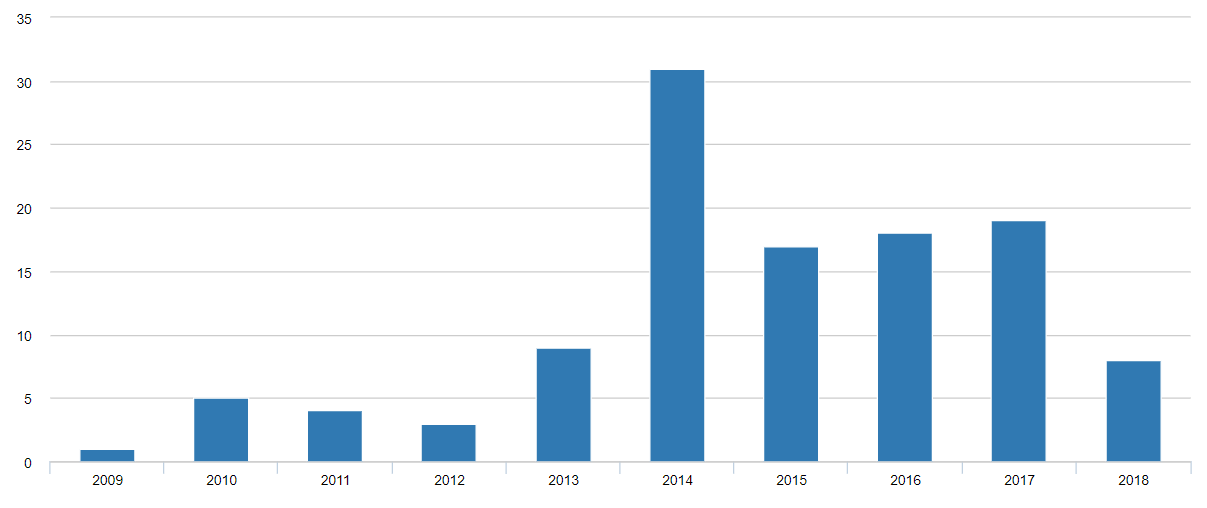
Number of incidents reported by victim’s population groups
عدد الحوادث التي بلّغت عنها مجموعات السكان التي تنتمي إليها الضحايا
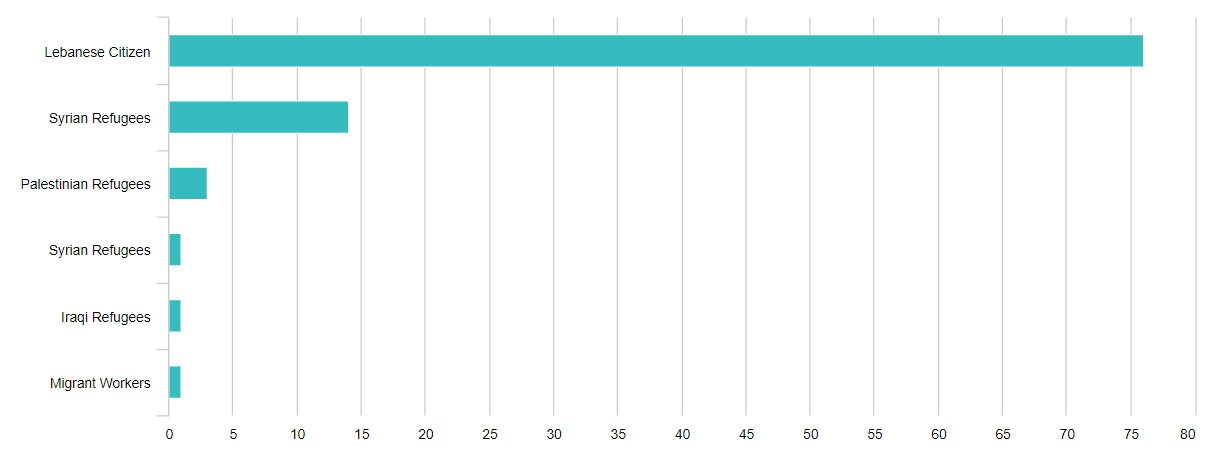
Number of incidents by type of violence
عدد الحوادث حسب نوع العنف

Explore all three interactive charts here.
استكشفوا كلّ الرسوم البيانية التفاعلية هنا.
Data from local centres - Association Najdeh
بيانات من المراكز المحلية ـ جمعية النجدة الاجتماعية
These interactive graphs visualise data from Association Najdeh’s call centres in the camps of Borj el-Barajneh, Beddaoui, Bekaa, Chatila, Saida, Naher el-Bared and Tyre. Association Najdeh’s local centres have been active since 1978 and offer training, psychological support, preschool activities, as well as domestic violence prevention and intervention.
The data focuses on reported cases relevant to gender-based violence, split into three categories:
تظهر هذه الرسوم البيانية بيانات من الخطوط الساخنة لجمعية النجدة الاجتماعية في مخيمات برج البراجنة والبداوي والبقاع وشاتيلا وصيدا ونهر البارد وصور. المراكز المحلية التابعة لجمعية نجدة فعالة منذ العام 1978، وهي تقدم التدريب والدعم النفسي ونشاطات في مرحلة ما قبل المدرسة وكذلك وقاية من العنف المنزلي والتدخل في حال حدوثه.
تركز البيانات على حالات مبلّغ عنها، تتعلق بالعنف المستند إلى النوع الاجتماعي، مقسمة إلى ثلاثة فئات:
Type of violence reported by sex
أنواع العنف المبلغ عنها حسب الجنس
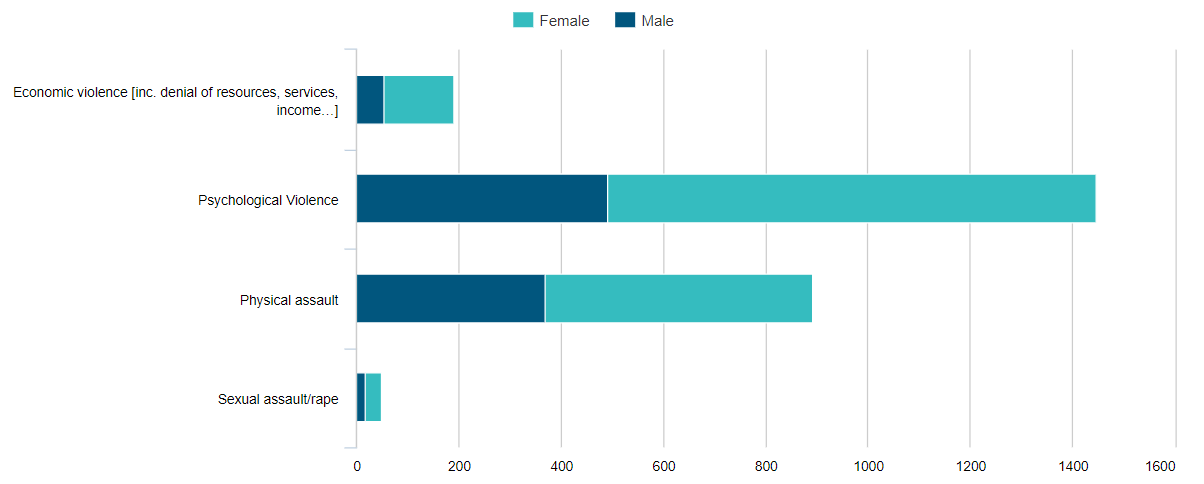
Type of violence by age range
نوع العنف حسب الفئة العمرية
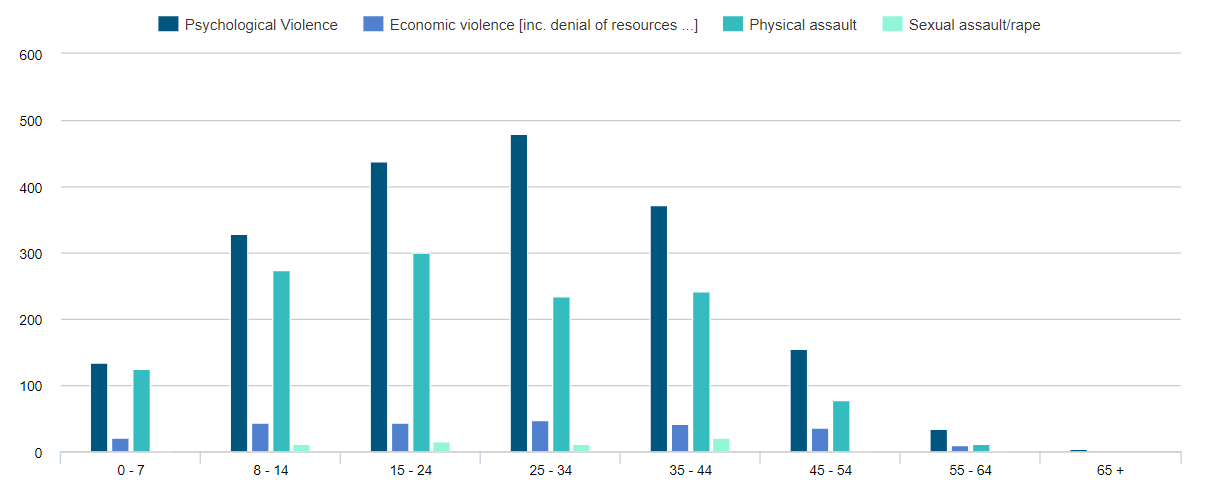
Number of reported cases by nationality
عدد الحالات المبلغ عنها حسب الجنسية
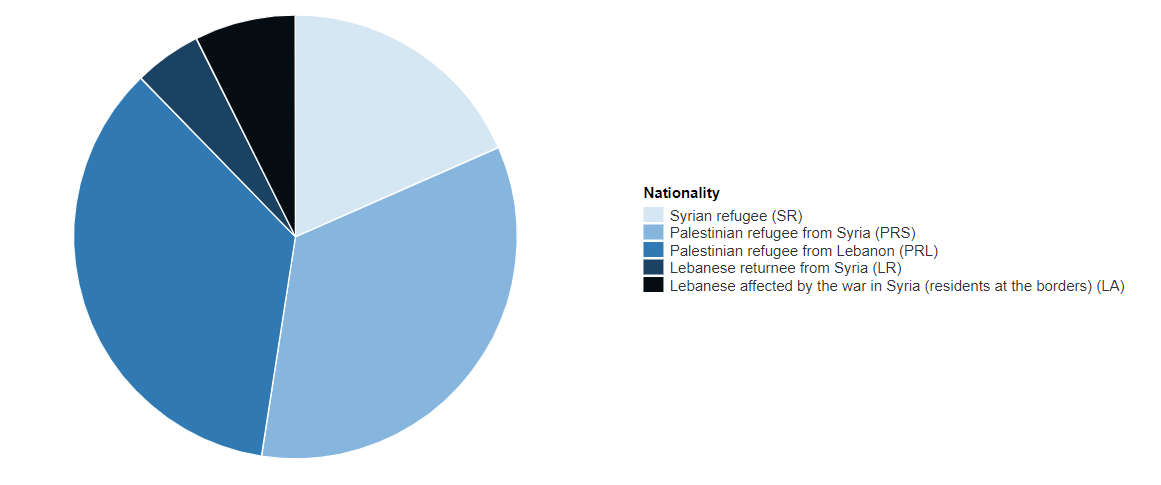
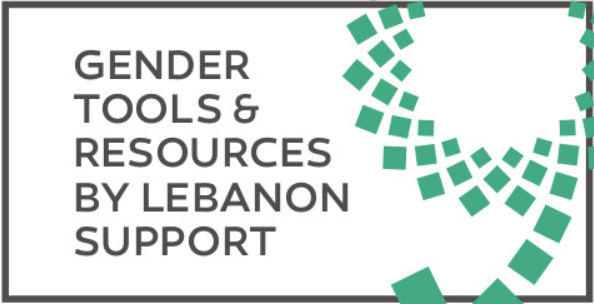
You can view all our “Gender Tools and Resources” on the interactive brochure, situated on the right side of our Gender Equity Network page. The brochure, available in both English and Arabic, highlights the gender products in each of our three programmes, including reports, bulletins, infographics, interactive maps, timelines, and testimonies.
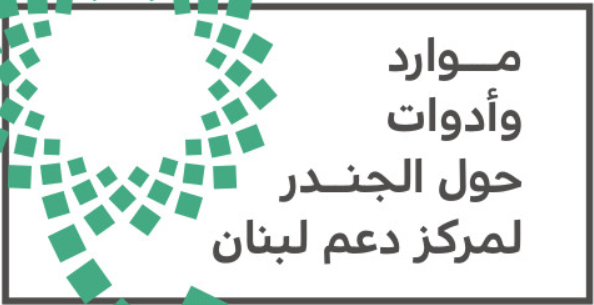
يمكنكم الإطلاع على كل "موارد وأدوات حول الجندر" الخاصة بنا على الكتيب التفاعلي الموجود على الجانب الأيمن من صفحة شبكة العدالة الجندرية الخاصة بنا. إنّ الكتيب متاح باللغة الإنكليزية والعربية، ويسلط الضوء على المنتجات الجندرية في كلٍّ من برامجنا الثلاثة، بما في ذلك التقارير والنشرات والرسوم البيانية والخرائط التفاعلية والخطوط الزمنيّة والشهادات الشخصيّة.
2. Events organised by Lebanon Support
النشاطات التي نظمها مركز دعم لبنان
On Friday 9 November, Lebanon Support organised a closed workshop at Key Apart Hotel with female research participants in order to present and discuss the research findings on barriers hindering womens’ full political participation in Lebanon, and develop recommendations for the ensuing policy brief after consultations with the participants. This increased the participants’ ownership of the recommendations produced, which enhanced the effectiveness and take-up of recommendations published.
في يوم الجمعة 9 تشرين الأول/ نوفمبر، نظّم مركز دعم لبنان ورشة عمل مغلقة في فندق كي أبارت مع باحثات مشاركات بهدف تقديم ومناقشة نتائج البحث حول العوائق التي تحول دون المشاركة السياسية الكاملة للمرأة في لبنان، وتقديم توصيات من أجل موجز لسياسات لاحق بعد التشاور مع المشاركات. وقد أدى ذلك إلى زيادة مسؤولية المشاركات للتوصيات الموضوعة، ما عزز الفعالية والاقبال على التوصيات المنشورة.
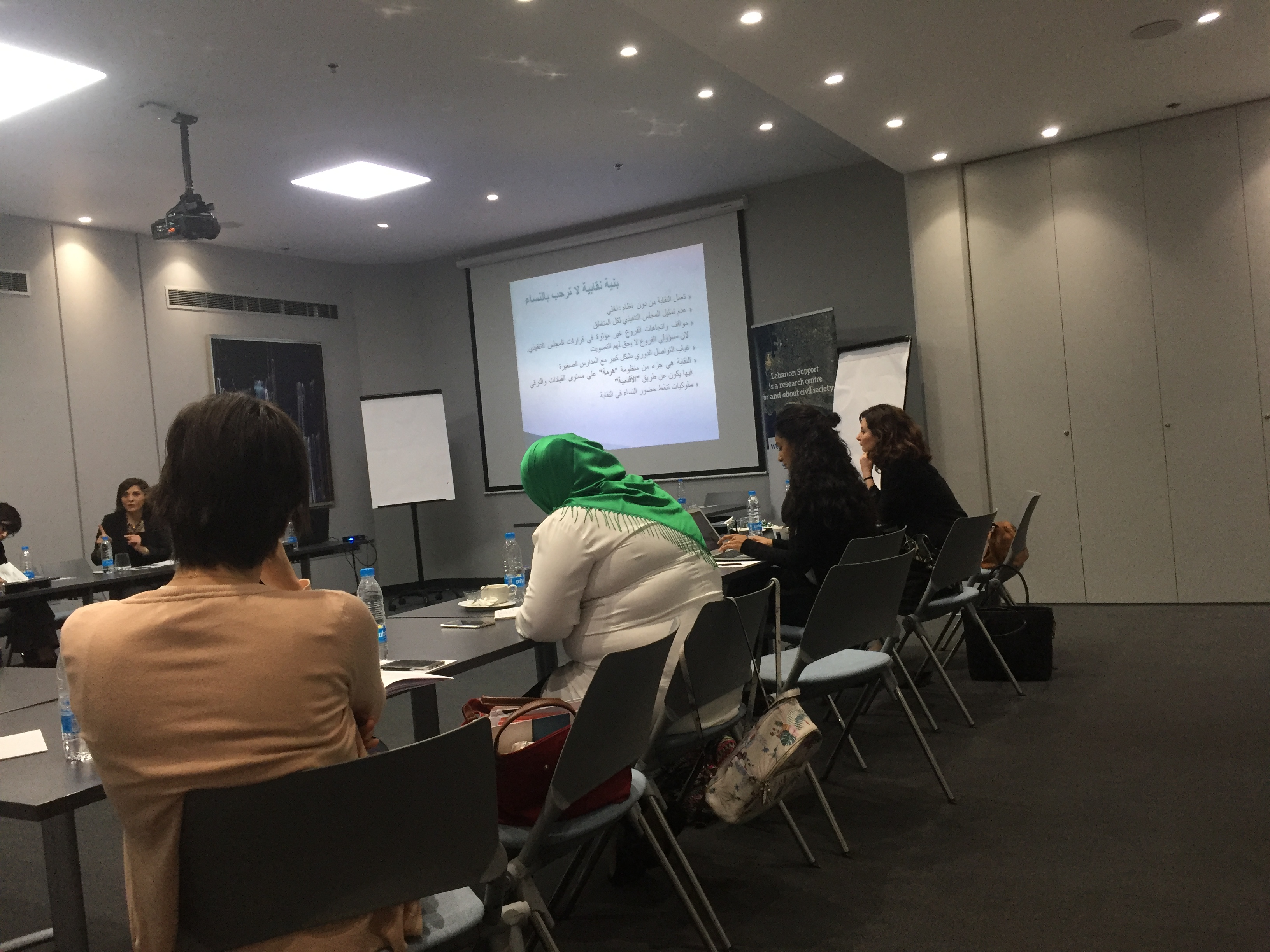
This roundtable allowed participants to reflect critically on women’s political participation in their respective organisational structures indicating that the research findings succeeded in providing impactful knowledge on the challenges faced by women. Based on the discussion, a set of strategic recommendations to enhance women’s political participation was developed.
This workshop is organised in partnership with Hivos International - Beirut Office, within the Women Empowered for Leadership programme (WE4L).
أتاحت حلقة النقاش هذه فرصة للمشاركات للتفكير بشكل نقدي في المشاركة السياسية للمرأة في هيئاتهن التنظيمية، ما يشير إلى أنّ نتائج البحث نجحت في تقديم معرفة مؤثرة بالتحديات التي تواجهها المرأة. استناداً إلى النقاش، تمت صياغة مجموعة توصيات استراتيجية لتعزيز المشاركة السياسية للمرأة.
تمّ تنظيم ورشة العمل هذه بالشراكة بين هيفوس إنترناشيونال - مكتب بيروت، ضمن برنامج تمكين النساء للقيادة (WE4L).
3. FOCUS ON - أضواء على
Women, Power, and Politics: Timelines and Milestones
النساء والسلطة والسياسة: خطوط زمنية وإنجازات بارزة
This timeline aims at documenting historical, social, and political achievements, notable events, and outstanding figures of the women’s movements in Lebanon as well as pioneering leader women’s trajectories. “Women, Power, and Politics: Timelines and Milestones” complements Lebanon Support’s existing timelines on “Women’s Achievements in Lebanon”, and “Women’s Movements in Lebanon” by merging their content, expanding on it, and filling the gaps in the data.
يهدف هذا الخط الزمني إلى توثيق الإنجازات التاريخية والاجتماعية والسياسية، والأحداث البارزة، والشخصيات المرموقة في الحركة النسائية في لبنان، وكذلك مسارات النساء القائدات الرائدات. يستكمل "النساء والسلطة والسياسة: خطوط زمنية وإنجازات بارزة" الخطوط الزمنية الحالية التي وضعها مركز دعم لبنان حول "إنجازات النساء في لبنان" و"الحركات النسائية في لبنان" عبر دمج محتواها والتوسع فيها وسد الثغرات في البيانات.
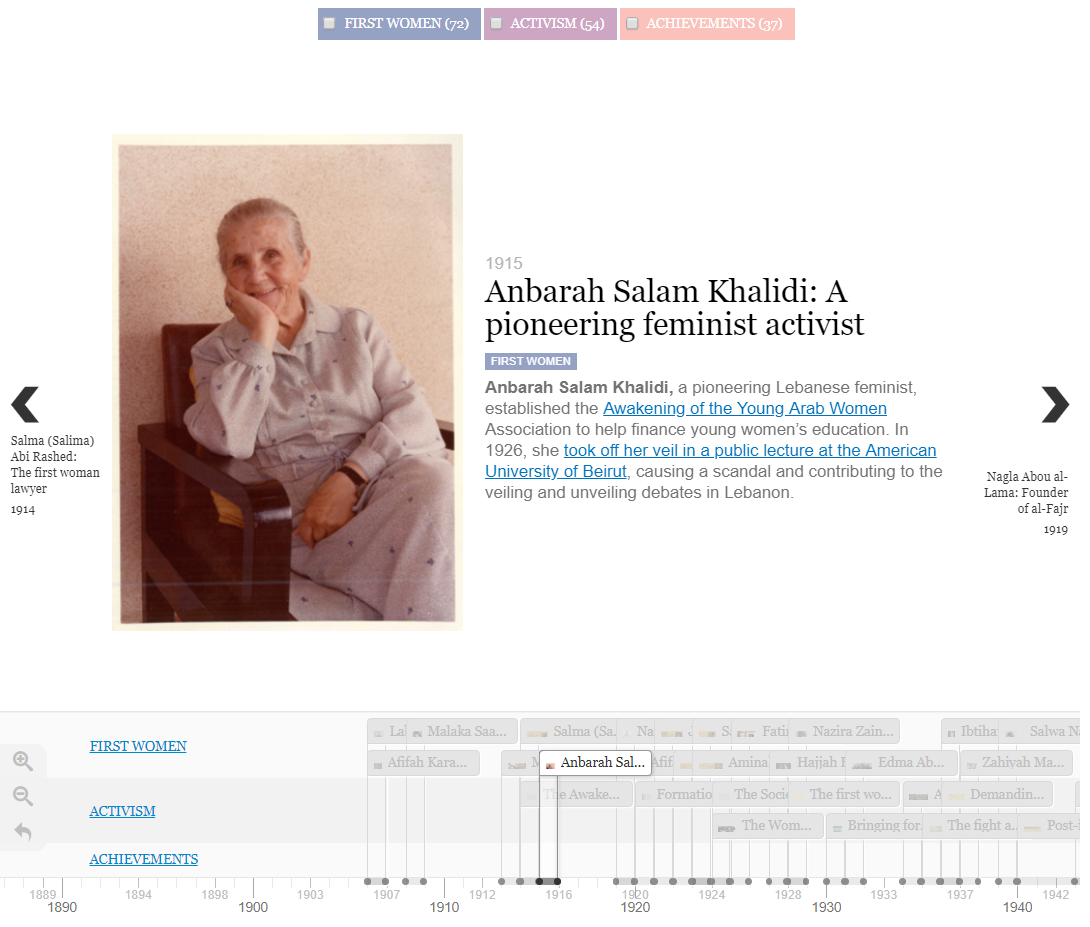
From the first woman to run for Lebanese Parliament to the annual Labour Day marches of migrant domestic workers who are excluded from national labour laws and governed by the restrictive Kafala system, the timeline provides well-organised, easily-accessible data that took two years to gather in the hopes of both honouring the women who furthered the feminist movement to where it is and inspiring an upcoming generation of female leaders. The timeline also allows researchers, activists, and everyday civilians to draw parallels between past and present.
منذ أول امرأة خاضت الانتخابات النيابية اللبنانية إلى مسيرات عيد العمال التي قامت بها العاملات المهاجرات في لبنان اللواتي استثنين من قوانين العمل المحلية ويحكمهنّ نظام الكفالة التقييدي، يوفر الخط الزمني بيانات منظمة وسهلة الوصول، استغرق جمعها سنتين على أمل تكريم النساء اللواتي عزّزن الحركة النسوية حتى وصلت إلى ما هي عليه الآن وألهمن الجيل التالي من القائدات. كما يتيح الخط الزمني للباحثين والناشطين والمواطنين إجراء مقارنات بين الماضي والحاضر.
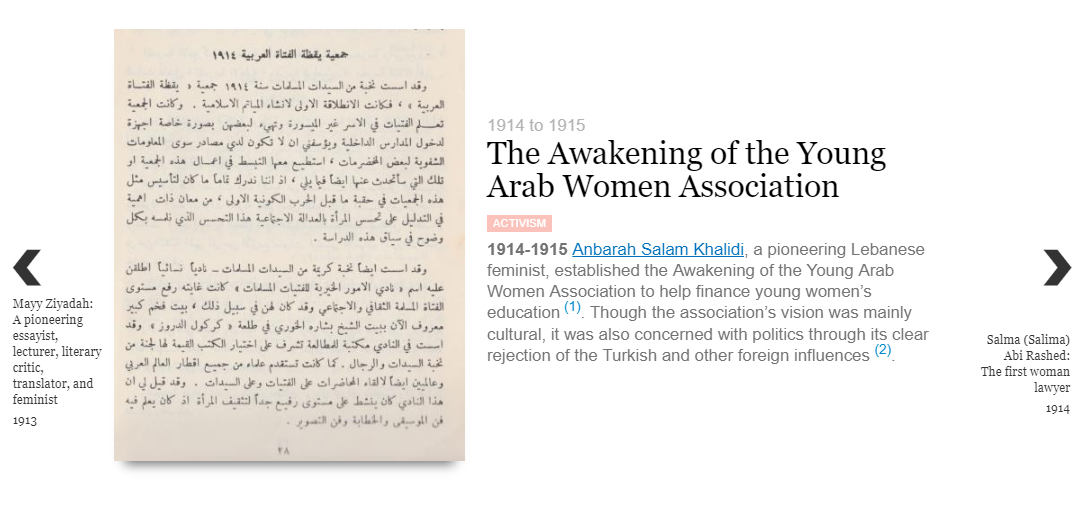
The content of the timelines was developed by Lebanon Support based on a 12 months long research. Visuals and archival content were gathered by URIKA. This timeline was developed in partnership with HIVOS through the WE4L programme, funded by the Netherlands Foreign Ministry FLOW fund, and was first published on Hivos’ website on this link.
طوّر محتوى الخط الزمني مركز دعم لبنان استنادًا إلى بحثٍ دام 12 شهراً، وقامت وكالة أوريكا URIKA بجمع المواد البصرية والمحتوى الأرشيفي. تم تطوير هذا الخط الزمني بالشراكة مع هيفوس عبر برنامج WE4L الذي يموله صندوق فلو FLOW في وزارة الخارجية الهولندية، ونُشر لأول مرة على موقع هيفوس الإلكتروني على هذا الرابط.
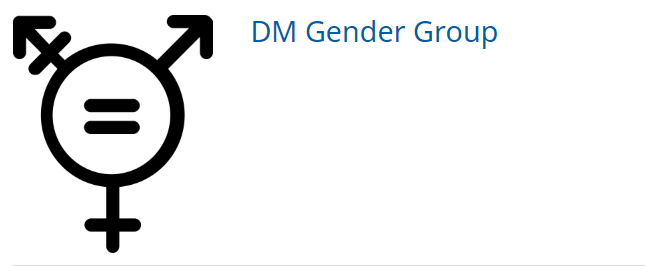
In the last month, Lebanon Support introduced several discussions on the Daleel Madani Gender Group* inspired from the latest gender trends and updates occuring in Lebanon and the region.
The first discussion discussed the role of CSOs in mental and sexual health awareness, inspired by the term “hormones” from Lebanon Support’s bilingual Gender Dictionary.
The second discussion talked about the newest proposed legislation on women’s Nationality rights by the National Commission of Lebanese Women (NCLW). The discussion highlights the gaps in the current draft law and possible rectifications.
The third and newest discussion linked to the recent ban on Grindr - the gay-friendly dating application - by the Ministry of Telecommunication. The discussion questions the role of CSOs in safeguarding freedom of expression and LGBTQIs rights.
*Daleel Madani Groups are online collaborative spaces that aim to bring together civil society actors around specific thematic issues for discussion, concerted action, and planning of campaigns and collaborations. The Gender Group on Daleel Madani, developed in partnership with Diakonia, features updates relevant to gender issues in Lebanon.
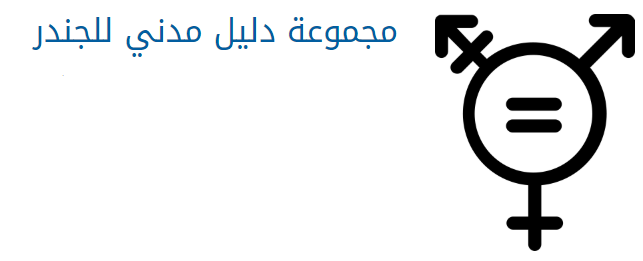
في الشهر الأخير، نشر مركز دعم لبنان مناقشات عديدة إلى مجموعة الجندر* في دليل مدني، مستوحاة من آخر الاتجاهات والأخبار الجندرية التي حصلت في لبنان والمنطقة.
تطرقت المناقشة الأولى إلى دور منظمات المجتمع المدني في التوعية بالصحة الجنسية والنفسية، واستلهمت مصطلح "هرمونات" من قاموس الجندر الثنائي اللغة الذي أصدره مركز دعم لبنان.
وتطرقت المناقشة الثانية إلى أحدث تشريع مقترح حول حق المرأة في منح جنسيتها، والذي قدمته الهيئة الوطنية لشؤون المرأة اللبنانية. تسلط المناقشة الضوء على الثغرات في مشروع القانون الحالي وعلى التصحيحات الممكنة.
وتناولت المناقشة الثالثة والأحدث منع وزارة الاتصالات لتطبيق غريندر مؤخراً ـ وهو تطبيق للمواعدة بين المثليين. شكك النقاش في دور منظمات المجتمع المدني في صون حرية التعبير وحقوق مجتمع المثليين والمثليات وثنائيي وثنائيات الميل الجنسي والمتحولين والمتحولات جنسياً وحاملي وحاملات صفات الجنسين والكوير.
* مجموعات دليل مدني هي مساحات تشاركية على الإنترنت تهدف إلى جمع الجهات الفاعلة في المجتمع المدني حول قضايا مواضيعية محددة من أجل النقاش والعمل المشترك والتخطيط للحملات وأوجه التعاون. وتعرض مجموعة الجندر على موقع دليل مدني، والتي تمّ تطويرها بالشراكة مع دياكونيا، الأخبار المتعلقة بقضايا الجندر في لبنان.
4. Gender Discussions
النقاشات الجندرية
On May 21, 2019, the National Commission for Lebanese Women (NCLW) presented a legislation proposal on the right of Lebanese women to pass on citizenship. Advocates of this cause have criticised major aspects of the draft law, it’s populist rationale and most importantly as it is not based on clear human rights standards. Indeed, the law not only enshrines discrimination between women and men but also creates a new type of discrimination between the children of Lebanese mothers as it only applies to children who are younger than 18 years old. Individuals older than 18 would only be eligible for a “green card” that restricts them from their political rights, the right to hold public office, and the right to own property. The law also does not apply to husbands, as it only applies to individuals related to women by blood.
My Nationality is a Right for Me and My Family Campaign renounced this law, stating that it discriminates against Lebanese women by maintaining a distinction between women and men’s equal rights in granting citizenship to their families. They also called on the parliamentary committee for the study and amendment of this law. Here are some experts’ perspectives on this topic;
بتاريخ 21 أيار/ مايو 2019، قدمت الهيئة الوطنية لشؤون المرأة اللبنانية مقترح تشريع حول حقوق المرأة اللبنانية في منح جنسيتها. انتقد المدافعون عن هذه القضية الجوانب الرئيسية في مسودة القانون وعقليته الشعبوية، والأهم عدم استناده إلى معايير واضحة لحقوق الإنسان. وبالفعل، لا يكرس القانون التمييز بين المرأة والرجل فحسب، بل إنه يخلق نوعًا من التمييز بين أبناء الأم اللبنانية ولا ينطبق إلا على الأبناء الذين تقل أعمارهم عن 18 عاماً. أمّا من تزيد أعمارهم عن 18 عاماً، فلا يحق لهم سوى "بطاقة خضراء" تقيد حقوقهم السياسية والحق في الوظائف الحكومية وفي الملكية الخاصة. لا ينطبق القانون على الأزواج، بل أنّه ينطبق فقط على الأفراد المرتبطين بالمرأة بصلة الدم. نددت حملة "جنسيتي حق لي ولأسرتي" بهذا القانون، إذ اعتبرته تمييزياً ضد المرأة اللبنانية بإبقائه على التمييز بين المرأة والرجل في منح الجنسية لأسرتهما. كما أنّها دعت لتشكيل لجنة نيابية لدراسة هذا القانون وتعديله. إليكم بعض آراء الخبراء بهذا الموضوع المنشورة على صفحة النقاشات على مجموعة دليل مدني للجندر هنا:
Lina Abou Habib Executive Director of the Women's Learning Partnership (WLP) and the Chair of the Board of the Collective for Research and Training on Development - Action (CRTD.A)
لينا أبو حبيب، المدير التنفيذي لمنظمة التضامن النسائي للتعلم (WLP) ورئيسة مجلس مجموعة الأبحاث والتدريب للعمل التنموي (CRTD.A)
“As a feminist activist who has worked on this specific issue since 2000, I am dissatisfied but not surprised by this law proposal which comes to further institutionalise inequality. Though pretending to be "pouring into an empty cup", as the NCLW president says, the law is actually without retroactive effect. Indeed, the only beneficiaries will be children born after the law whilst all the others, under or over 18, will have to go through procedures to enjoy this right. This new law in fact creates inequalities within the same family! In addition, thousands of women activists who have relentlessly lobbied in the streets and with the media and policy makers will actually be denied this right. On the other hand, we have started to hear politicians already rejecting the possibility of including Syrians, Palestinians and other Arabs amongst the future "beneficiaries" under the guise of safeguarding national sovereignty. This is clearly paving the way to further discrimination and inequalities which are reinforced by this new law.
My personal feeling on that is this law will pass with additional restrictions. It will be a new sexist and racist law which will disregard Lebanon's commitments to CEDAW and other international Human Rights obligations. Whilst this law may help a few individuals, it will further exacerbate the subordinate and unequal position of women as citizens of Lebanon.”
"بوصفي ناشطة نسوية عملت على هذا الموضوع تحديداً منذ العام 2000، أنا غير راضية لكنني لا أشعر بالمفاجأة من هذا القانون المقترح الذي يأتي ليزيد مأسسة عدم المساواة. وعلى الرغم من أنّ القانون يتظاهر "بالسكب في كأس فارغة"، مثلما تقول رئيسة الهيئة الوطنية لشؤون المرأة اللبنانية، فليس له في واقع الأمر مفعول رجعي. وبالفعل، سيكون المستفيدون الوحيدون الأبناء الذين ولدوا بعد إقرار القانون في حين أنّ الأبناء الآخرين، سواءٌ أكانت أعمارهم أقل أو أكثر من 18 سنة، سيضطرون للقيام بإجراءات للحصول على هذا الحق. واقع الأمر أنّ القانون الجديد يخلق تفاوتاتٍ ضمن الأسرة عينها! علاوةً على ذلك، فإنّ آلاف الناشطات اللواتي ضغطن من دون كلل أو ملل في الشوارع ولدى وسائل الإعلام وصانعي القرار لن يحصلن على هذا الحق. من جانب آخر، بدأنا نسمع سياسيين يرفضون أصلاً احتمال ضم السوريين والفلسطينيين والعرب الآخرين من ضمن "المستفيدين" المستقبليين بذريعة الحفاظ على السيادة الوطنية. وهذا يمهد الطريق لمزيدٍ من التمييز والتفاوتات التي يعززها هذا القانون الجديد.
لدي إحساس بأنّ هذا القانون سوف يقَر بتقييدات أخرى. سيكون قانوناً جديداً متحيزاً جنسياً وعنصرياً يخلّ بالتزامات لبنان تجاه اتفاقية السيداو وبقية التزامات حقوق الإنسان الدولية. وفي حين أنّ هذا القانون يمكن أن يساعد بعض الأفراد، لكنّه سيفاقم خضوع المرأة ووضعها غير المتكافئ كمواطنة لبنانية".
Manar Zaiter Consultant and Expert
منار زعيتر، مستشارة و خبيرة ـ
“For years, several campaigns have been held in Lebanon, especially those pertaining to the nationality law, notably the My Nationality is a Right for Me and My Family campaign; and there are many draft laws including amendments to this law. The new law, submitted by the National Commission of Lebanese Women (NCLW), is of poor quality and violates human rights approaches and Lebanon’s international commitments. Fragmenting rights is a threat to human rights values and principles. Political considerations and phrases like “that is all there is” or “the maximum level” cannot override rights.
The draft discriminates between a child and another, and excludes children above 18 from accessing their right. The proposal is based on the preamble of the constitution; however, this preamble obliges Lebanon to abide by international conventions and speak for equality without preference or discrimination. The proposed law differentiates between men and women, and only mentions children without mentioning the husband, while the current law grants a foreign wife of a Lebanese man the right to acquire nationality within a year of registering their marriage. The fact that the National Commission of Lebanese Wome (NCLW) proposed this law and not a political party should have, with all due respect to its efforts, represented all women and ensured their rights, away from political and demographic discourses. To say that the proposal is a first step to reach the parliament, then the ceiling of demands will be raised is not strategic nor accurate as our demands should be made clear ahead of devising advocacy strategies, which are a different matter. “The principle of gender equality means that every child born of a Lebanese father or a Lebanese mother must be considered Lebanese."
After passing this law, discrimination among members of the same family will occur. Discrimination against certain nationalities, notably Palestinian and Syrian nationality, pertains to the political and popular discourses against refugees, and the impact of the political situation on the overall administrative decisions in Lebanon and on relevant organs and bodies."
"ينشط في لبنان حملات عدة منذ سنوات خاصة بقانون الجنسية، واهمها حملة جنسيتي حق لي ولأسرتي وثمة عدد من مشاريع القوانين المقدمة الخاصة بتعديلات تطال القانون. القانون الجديد الذي تقدمت به الهيئة الوطنية لشؤون المرأة اللبنانية غير جيد ومخالف للمقاربات حقوق الانسان ولالتزمات لبنان الدولية. إن تجزئة الحق هو ضرب لقيم ومبادئ حقوق الإنسان. لا يمكن عند الحديث عن الحقوق مراعاة التوازنات والحسابات السياسية والانطلاق من عبارة" هذا هو المتاح" وهذا " اقصى الممكن".
المشروع يميز بين ولد وولد والمشروع ينسف حق اولاد اللبنانية الذين تخطوا سن 18 بالحصول على هذا الحق ويتركههم أسرى الإجراءات و الاستنسابية. أن المقترح ينطلق من مقدمة الدستور ولكن هذه المقدمة تلزم لبنان المعايير الدولية ولهذه المقدمة قيمة دستورية وهذه المعايير تتكلم عن المساواة بدون تمييز او تفضيل. المقترح بقي يميز بين الشروط التي تنطبق على الرجل وتلك التي تنطبق على المرأة. المقترح تكلم عن الأولاد فقط دون الحديث عن الزوج في حين أن القانون الحالي يمنح الزوجة الاجنبية حق الحصول على الجنسية بعد سنة من تاريخ تسجيل الزواج في قلم النفوس. الاقتراح سيء لأنه صادر عن الهيئة الوطنية وليس عن حزب سياسي ويفترض بالهيئة ومع كل التقدير لجهودها أن تمثل كل النساء وأن تحرص على تنزيل حقوقهن عن الحسابات السياسية والديمغرافية. القول أن الاقتراح مدخل وعند وصوله الى مجلس النواب يرفع السقف أمر غير صحيح فالمفترض أن يكون سقف المطلب واضحا اما استراتيجيات المناصرة والضغط فذلك أمر مختلف. أن "مبدأ المساواة بين الجنسين يعني أن كل طفل مولود من أب لبناني أو أمّ لبنانية يجب أن يعتبر لبنانيا". باختصار انه يبقى الأولاد الراشدين تحت قبضة الإدارات واستنسابيتها في منح الجنسية لمن تريد.
بعد تمرير هذا القانون، تمييز بين أفراد الاسرة الواحدة الاستنسابية في تطبيق القانون هن من بعض التداعيات التي يمكن أن تحدث. تمييز بوجه جنسيات بعينها ولا سيما الجنسية الفلسطينية والسورية وكلنا نعلم الخطاب السياسي والشعبي بوجه اللاجئين وتأثير الحالة السياسية على مجمل القرارات الادارية في لبنان وعلى الاجهزة والدوائر المعنية."
5. Newest gender organisations registered on Daleel Madani
الفاعلين المختصّين بالجندر المسجّلين حديثًا على دليل مدني
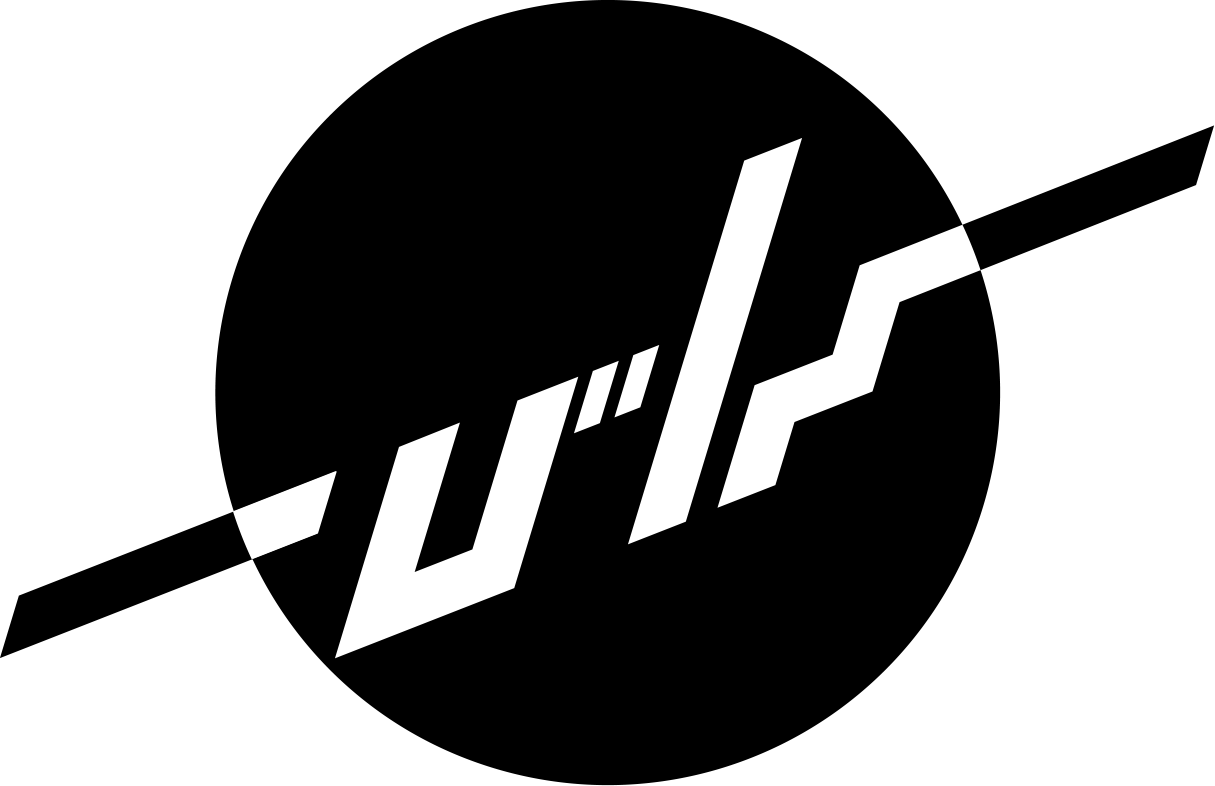 Qorras:
Qorras:
View their profile on Daleel Madani here.
Qorras is a group that aims to work on knowledge relating to the issues of gender and sexuality in the MENA region, while acknowledging that the work it does is mostly inspired and based in a more Levantine, Lebanese context. Qorras focuses on collecting, producing, and disseminating crucial knowledge in the broader sense of the word, all other approaches come to feed this main goal. As a result, Qorras works on the following to theorize personal and subjective experiences, to build on the work of others, to document processes, to disseminate creatively.
كراس:
اضغط/ي هنا لصفحة المنظمة على دليل مدني
كراس مجموعة تسعى للعمل على المعرفة في مجال الجندر والجنسانية في منطقة الشرق الأوسط وشمال أفريقيا، مع الإرتكاز بالدرجة الأولى على السياق المشرقي واللبناني. تركز كراس على جمع وإنتاج ونشر المعرفة بمعناها العريض، فتأتي مقاربتها لسائر المجالات دعماُ لهذه المعرفة. ومن هذا المنطلق تعمل كراس على ما يلي: أشكلة التجربة الذاتية والشخصية، خلق مساحات تفاعلية وبناء مشاريع تبني على مبادرات المجتمع المدني، إعادة الإعتبار للرحلة في الإنتاج المعرفي، النشر بهدف الإنتشار.

Young Women’s Christian Association:
View their profile on Daleel Madani here.
The Young Women’s Christian Association Beirut (YWCA) are a local civil society organisation whose mission is to promote the collective power of women in order for them to achieve equal rights, health, security, dignity, freedom and sustainable environment for all.
جمعية الشابات المسيحية - بيروت
اضغط/ي هنا لصفحة المنظمة على دليل مدني
جمعية الشابات المسيحيات ببيروت منظمة مجتمع مدني محلية مهمتها الترويج للقوة الجماعية للنساء بهدف حصول الجميع على الحقوق المتساوية والصحة والأمان والكرامة والحرية والبيئة المستدامة
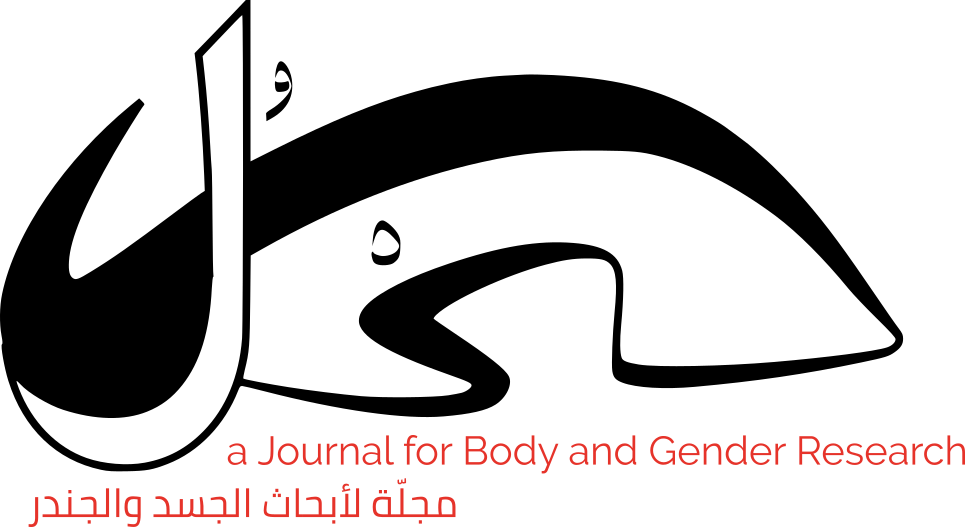 Kohl Journal - Intersectional Knowledge Publishers
Kohl Journal - Intersectional Knowledge Publishers
View their profile on Daleel Madani here.
Kohl: a Journal for Body and Gender Research s a progressive, feminist journal on gender and sexuality in the Middle East, South West Asia, and North Africa regions. Kohl Journal is a biannual, multilingual, open access, and peer reviewed academic journal. It targets mainly, but not exclusively, graduate-level academics, fresh graduates, independent writers, activists, and researchers who are not affiliated with an academic institution.
مجلة كحل - ناشرو المعرفة المتقاطعة
اضغط/ي هنا لصفحة المنظمة على دليل مدني
كُحْل: مجلّة لأبحاث الجسد والجندر، هي مجلّة نسويّة تقدّميّة عن النّوع الاجتماعي والجنسانيّة في مناطق الشّرق الأوسط وجنوب شرق آسيا وشمال أفريقيا. كحل مجلّة أكاديميّة، نصف سنويّة، متعددة اللغات، مفتوحة المصدر، خاضعة لمراجعة الأقران. تستهدف المجلّة بشكل رئيسي، على سبيل المثال لا الحصر، الأكاديميين/ات الشباب/الشابات في مستوى الدراسات العليا، والخريجين/ات الجُدد، الكتّاب/الكاتبات المستقلين/ات، والناشطين/ات والباحثين/ات الذين/اللواتي لا ينتمون إلى مؤسسة أكاديمية.
6. Gender news
أخبار الجندر
. From Lebanon
- On June 26, parliament members passed a law exempting children of Lebanese mothers married to non-Lebanese and holders of a residence permit from obtaining work permits.
- On January 31, after 9 long-awaited months of negotiations, the Lebanese new cabinet includes four new women ministers, a historical record for women in Lebanon. These women took the leadership of the Ministry of Energy and Water, Ministry of State for Administrative Affairs, Ministry of Interior and Municipalities, and Ministry of State for Social and Economic Rehabilitation for Youth and Women.
- On January 17, mobile network companies Alfa and Touch, banned Grindr, a popular gay dating application. On January 23, the companies confirmed receiving orders from the Ministry of Telecommunication which requested the ban under the pretence of security issues. On May 28, the ministry took the ban a step further by releasing a public memo to fully implement the ban on all national telecom companies. Digital rights and LGBTIQ rights organisations, condemned the ban as a breach of freedom of expression and association, with Grindr for Equality also issuing a statement about it.
- On March 9, hundreds took to the streets to demonstrate under the slogan “For a Just Economy, We Will March” as part of International Women’s Day. The protesters included Lebanese women who called for their right to nationality and full citizenship, but also migrant domestic workers from the Migrant Community Center who called for the abolition of the discriminatory Kafala system.
- On March 30, Lebanon's top military prosecutor, Judge Peter Germanos, decided against the prosecution of four military personnel under Law 534, a legislation which has been historically interpreted to criminalise homosexual acts in Lebanon. This has been considered as a landmark decision, a first in the Lebanese military court system which follows a trend of decriminalizing same-sex relations that began in Lebanon’s civil courts in 2009.
. من لبنان
- بتاريخ 26 حزيران/ يونيو، أقر مجلس النواب قانون اعفاء اولاد المرأة اللبنانية المتزوجة من غير لبناني والحائزين على إقامات مجاملة من الاستحصال على اجازة عمل.
- بتاريخ 31 كانون الثاني/ يناير، بعد مفاوضات دامت تسعة أشهر، ضمت الحكومة اللبنانية الجديدة أربع وزيرات، وهو رقم قياسي للنساء في لبنان. تولت هذه النساء وزارة المياه والطاقة، ووزارة الدولة للشؤون الإدارية، ووزارة الداخلية والبلديات، ووزارة الدولة لشؤون المرأة والشباب.
- بتاريخ 17 كانون الثاني/ يناير، قامت شركتا ألفا وتاتش بحظر غريندر، وهو تطبيق شعبي لمواعدة المثليين. وبتاريخ 23 كانون الثاني/ يناير، أكدت الشركتان بأنهما تلقتا أوامر من وزارة الاتصالات تطلب منهما الحظر بذرائع أمنية. وبتاريخ 28 أيار/ مايو، خطت الوزارة خطوةً إضافية، عبر نشرها مذكرة تلزم كافة شركات الاتصالات الوطنية بالحظر. شجبت المنظمات المعنية بمجتمع الكوير وبالحقوق الرقمية الحظر بوصفه انتهاكاً لحرية التعبير والاجتماع، كما أطلق تطبيق غريندر للمساواة بيان بما يخص هذا الموضوع.
- بتاريخ 9 آذار/ مارس، تظاهر مئات الناس في الشوارع تحت شعار: "كرمال اقتصاد عادل، بدنا نمشي" كجزء من الاحتفال بيوم المرأة العالمي. وكان من بين المحتجين نساء لبنانيات طالبن بحقهن في منح الجنسية وفي حقوق المواطنة الكاملة، وكذلك العاملات المنزليات المهاجرات من مركز المهاجرين، دعون لإلغاء نظام الكفالة التمييزي.
- بتاريخ 30 آذار/ مارس، قرر المدعي العام العسكري، القاضي بيتر جرمانوس، الامتناع عن توقيف أربعة عسكريين بموجب القانون 534 الذي تم تفسيره تاريخياً لتجريم الأفعال المثلية في لبنان. وقد كان ذلك القرار تاريخياً، بوصفه أول قرار من نوعه في الجهاز القضائي العسكري يتبع توجهاً بدأ في المحاكم المدنية اللبنانية في العام 2009 لعدم تجريم العلاقات بين شخصين من الجنس عينه.
. Around the world
- From the 22 till the 25 of March, “Mawjoudin” (We Exist), a queer film festival was held in Tunisia, where homosexuality is illegal. The film festival features a series of short and medium-length films from Africa and the Middle East, focusing mainly on the issue of non-normative gender and sexuality, breaking thus the taboos around this theme.
- Since April 6, Sudanese female activists have been leading the new pro-democracy movement in Sudan, through protests and sit-ins in Khartoum, to put pressure on the ruling military council and President Omar Al-Bachir.
- On May 15, the Republican State Senate in Alabama passed a near-total ban on abortion, making it a crime to perform the procedure at any stage of pregnancy. The new abortion ban spurred public outrage and has been seen by many as a step backwards in the fight for women’s rights.
- On February 6, Human Rights Watch released a report exposing targeting and attacks of women’s rights groups by the Polish government. Through raids and defunding, often with little warning and no clear rationale, Poland’s ruling Law & Justice party has been labelling women’s rights organisations and their work as dangerous to familial and traditional values.
. حول العالم
- من 22 إلى 25 آذار/ مارس، أقيم مهرجان "موجودين" وهو مهرجان سينمائي للأفلام الكويرية في تونس، حيث المثلية الجنسية غير مشروعة. عرضت في المهرجان مجموعة من الأفلام القصيرة والمتوسطة من أفريقيا والشرق الأوسط، تركز بصورة أساسية على موضوع النوع الاجتماعي غير المعياري وتكسر المحظورات حول هذا الموضوع.
- منذ 6 نيسان/ أبريل، تترأس الناشطات السودانيات التحرك الجديد من أجل الديمقراطية في السودان، عبر الاحتجاجات والاعتصامات في الخرطوم، للضغط على المجلس العسكري الحاكم والرئيس عمر البشير.
- بتاريخ 15 أيار/ مايو، قام مجلس شيوخ الولاية الجمهوري في ألاباما بإقرار حظر شبه كامل للإجهاض، فجعله إجراءً جرمياً في أي مرحلة من الحمل. أثار الحظر الجديد للإجهاض استياءً عاماً ونظر إليه كثيرون بوصفه خطوةً إلى الوراء في النضال من أجل حقوق المرأة.
- في 6 شباط/ فبراير، نشرت منظمة هيومان رايتس ووتش تقريراً يعرض استهداف الحكومة البولونية لمجموعات حقوق المرأة والهجوم عليها. عبر المداهمات وإلغاء التمويل، وبقليلٍ من التحذير وعدم وجود عقلانية واضحة في كثيرٍ من الأحيان، وسم حزب القانون والعدالة البولوني الحاكم منظمات حقوق المرأة وعملها بأنه خطر على القيم الأسرية والتقليدية.


